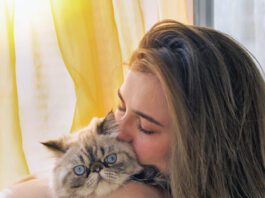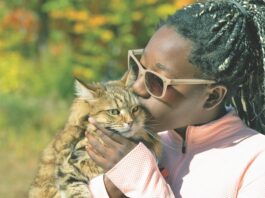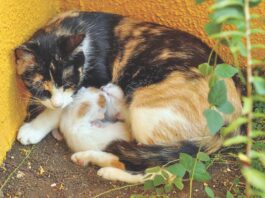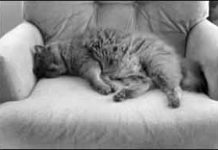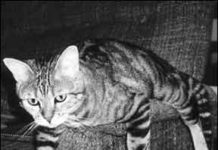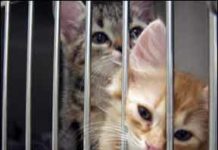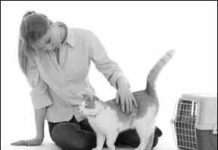Holiday Overload Can Affect Their Health
With shopping, traveling and entertaining, the weeks between Thanksgiving and New Year’s can be anything but relaxing. However, humans aren’t the only individuals to suffer holiday overload. Cats can also become stressed, and if prolonged, the stress can result in changes in health and behavior. “I could write a book about the physiology of stress,” says Germain F. Rivard, DVM, Ph.D., a resident in behavioral medicine at Cornell University College of Veterinary Medicine. “A cat under stress would change personality as he loses his coping mechanisms. Often, the reaction is avoidance with or without vocalizations, and if the cat cannot escape, he defends himself aggressively. That’s why it is important to create a safe place ahead of time.”
In The News: October 2012
Wollie, a 3 -year-old black cat, made national news when he walked six miles to find his way home from an animal shelter in Bedford, N.H. Barbara Oliphant had taken in the stray but gave him up when her husband became ill. When her husband improved, Oliphant’s daughter adopted Wollie as a surprise for her, but the cat escaped his carrier in the shelter parking lot. He appeared at Oliphant’s door three days later. The inevitable question: How did he do that? Behaviorist Katherine A. Houpt, VMD, at Cornell offers the likely explanation: “He was a stray and familiar with the area.”
Is Your Cat Afraid of Strange Noises?
Whenever cat owner Susan Lomond turns on her printer, her cat Sylvester dashes over to sit on it, lie on it and watch in fascination as the paper comes out. But when Susan’s friend Diana turns on her printer, her cat, Petra, flees in terror. Cats respond differently to noise depending on their personalities and experiences — and even their genetics. When cats get scared of noise, we often feel the need to soothe them. Actually, that may not be helpful. How to Help Your Cat. Cats differ from dogs when it comes to being frightened by noise. Dogs are notoriously afraid of thunder and fireworks, and will often try to escape from the house in a panic. Cats are more likely to be scared of unexpected noises around the house, such as the vacuum cleaner, construction work or a hair dryer. “But thunder and fireworks don’t seem to bother cats,” says Katherine A. Houpt, VMD, PhD, the emeritus James Law Professor of Animal Behavior at Cornell University’s College of Veterinary Medicine. “I have never seen fireworks or thunder phobia in cats,” she says.
Movies for Cats: A Good Daytime Baby Sitter
A bored cat is often an unhappy cat. Just like humans, cats need stimulation; when left on their own too long, they can experience loneliness and even depression. An unhappy cat may lose or gain weight, stop grooming itself or even become destructive. And a cat with nothing to do will often sleep the day away instead of getting needed exercise. For those of us who must leave our pets alone for long hours while at work or elsewhere, the solution could be just a click away: Turn on the TV and put on a movie designed just for cats.
Understanding the Elderly Cat
Thanks to advances in all fields of veterinary medicine, it is not uncommon these days for a cat to live to the very ripe old age of 20 — roughly the physiologic equivalent of age 93 in a human. That’s the good news. The bad news is that cats, like humans, become increasingly susceptible to age-related disease conditions as they grow old, and most of these disorders are bound to have an effect on an animal’s behavior. Arthritis, for example, is likely to cause a formerly rambunctious cat to slow down dramatically as it transitions through its so-called golden years; kidney and urinary tract disease may severely affect its litter box behavior; progressive periodontal disease and tooth loss may alter its eating habits; and progressive hearing problems may make a cat decreasingly responsive to its environment.
Ask Elizabeth: April 2012
Dear Elizabeth: Last summer, my husband and I became the proud keepers of Miss Looci, a four-week-old rescue cat. She’s a lovely, strictly indoor cat — long-haired and pure black. Since she’s been with us, Looci has become my home-bound husband’s constant companion, and she’s become quite big and strong. We love her, and she gets plenty of attention. But here’s our problem: Looci has the habit of suddenly biting me, my husband or our guests while she’s being petted. Why does she do this, and how can we stop her?
How to Curb Destructive Scratching
Just days after youve invested in new furniture, your cat decides she really loves it, too. Its the place shes chosen to give herself a pedicure, and soon the arms of that beautiful new sofa look like theyve gone through a shredder. You may notice your cat flexing her nails when she first gets up and stretches or suddenly stop to sink her nails into the wall-to-wall carpeting as she crosses a room. She may scratch at the end of a burst of energy after playing with her favorite toy. Fabrics, carpet, wood, cardboard - there are numerous materials in your house that can soon become a target for your cats clawing.
Take Your Cat for a Walk!
Lucky, a striking gray tabby with bright green eyes, touches blades of grass, rolls around on the sunny deck and strolls over to sniff blackberry branches. Its all part of his regular walk around the fenced backyard with his human companion, who supervises his short outings. Since he is not particularly agile, his owner doesnt worry about quick escapes or even a leash. Buckys feline buddy, however, is a different matter. Jade, an agile black cat, loves the great outdoors as much as Bucky, but her athletic prowess easily has her up, up and away in a matter of seconds. Walking Jade outside requires an appropriate harness and leash. Whether you live with a Jade or a Bucky type, walking your cat will bear little resemblance to a conventional walk with the dog. Your cat probably will not like striding along at a brisk pace on a concrete sidewalk. That doesnt mean, however, that taking a walk with your cat isnt a great idea.
Using Automatic Feeders & Waterers
Susan McDaniels was having a problem getting her cat, Starfish, to drink enough water. Starfish ignored the bowls of fresh water that were strategically placed around the house, preferring instead to drink water from a drippy faucet. That’s when McDaniels had an idea. What if she could provide fresh, running water for Starfish all the time? “I thought it would be a novel idea to get an automatic waterer for my cat,” the Santa Barbara, California, resident remembers. “Nothing else was working.”McDaniels went online and purchased an electric waterer that doubled as an attractive fountain. Most importantly, her cat began to drink plenty of water. “Starfish finds the fountain to be very entertaining, and it helped with water consumption,” she says.
Ask Elizabeth: February 2012
Dear Elizabeth: Help! My cat Decker’s yowling is keeping me awake at night. I have become truly desperate for a good night’s sleep! - I can certainly sympathize with your need for sleep. Decker may be keeping you awake at night due to medical or behavioral reasons. Without more background information, I don’t know which is likely to be responsible in your case, so I’ll discuss several possibilities in the hopes that I hit upon the cause behind Decker’s insomnia. In the meantime, you should schedule an appointment with your veterinarian.
Short Takes: February 2012
In shelter and rescue situations, it is extremely important for personnel to identify the most adoptable animals whose adoptions are unlikely to be delayed for medical reasons. This study (“Risk factors for delays between intake and veterinary approval for adoption on medical grounds in shelter puppies and kittens,” in Preventive Veterinary Medicine, 2011) was designed to identify risk factors for health-related delays from intake to approval for adoption in shelter puppies and kittens.
Going Away? Plan for Your Pet’s Care
You have a wonderful vacation planned, a two-week escapade to a sunny island after a long year of hard work and stress. You’ve been looking forward to it for months, but a nagging problem remains: Who should take care of Tiger while you’re away? How to Decide. What you do with your cat when you take a vacation should depend on your cat’s personality, health condition, age and the resources available where you live. Hiring a pet sitter, kenneling your cat or boarding him with a veterinarian are all reasonable options for care when you aren’t home.


